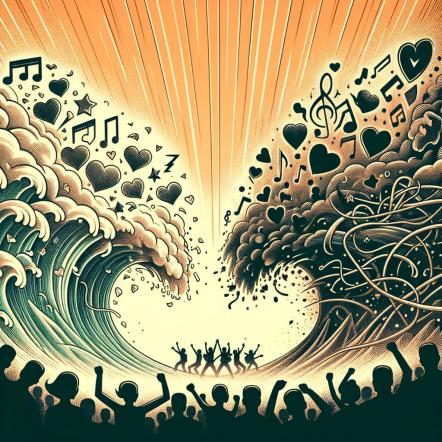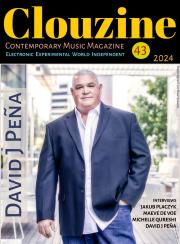New York, NY (Top40 Charts) The arrival of the "Fab Four" in New York on 7 February 1964 marked the beginning of a triumphant American tour. Hordes of teenagers were gripped by "Beatlemania". There were tumultuous scenes of jubilation - but a few years later there were also angry protests against the musicians.
The invasion began on a Friday at 1.20 pm local time. A four-man British troop landed on the east coast of the USA. Thousands of locals were already waiting for them there. Events quickly came thick and fast - within minutes of the British getting off the plane, many of the Americans were shouting so loudly that they drowned out even the roar of the jet engines.
However, the "British Invasion" of 7 February 1964 was not a violent military operation, even though an entire continent was taken by storm. The screams were hysterical shrieks of joy, primarily from female teenagers. And the four young Brits were not shaven-headed soldiers with rifles, but Liverpool lads with mushroom haircuts and guitars in their luggage: the Beatles.
Tumultuous scenes took place and dozens of police officers were deployed at New York airport to ensure that "the English twist stars" were not overrun by their fans, as the German newspaper Bild reported the following day: "Jeering and singing teenagers welcomed the quartet of pop singers with banners such as 'We love you'. The Beatles, whose music also tops the list of favourite records in the United States, embark on an American tour lasting several weeks. The Beatles' global career began in a Twist pub in Hamburg."
In the midst of the frenzy, Slotozen casino login invites you to experience your own exciting gambling adventure with our exclusive promotion! Experience the excitement of online gaming and enjoy an exciting range of games while taking advantage of our generous bonuses and rewards.
With their unmistakable sound, look and humour, John Lennon, Paul McCartney, George Harrison and Ringo Starr were at the height of the zeitgeist. In 1963, they gave a concert in front of the royal family, had five hit singles and two number one albums in the UK.
Euphoric Beatles fans in February 1964. On the left, a young woman tries to get under the crowd standing on benches so that she can at least catch a glimpse of the musicians' feet
The second, "With The Beatles", was released at the end of November 1963, and a modified version entitled "Meet The Beatles!" was released in the USA on 20 January 1964. On 1 February 1964, the single "I Want To Hold Your Hand", available in the USA since Christmas 1963, reached number 1 in the American Billboard hit parade.
This was followed by the triumphant American tour of the "Fab Four" in February 1964, marking the first breakthrough for British musicians on the US market. Performing live on the popular and highly influential "Ed Sullivan Show", the Beatles set a TV ratings record with 73 million viewers (60 percent of all potential TV viewers at the time).
This was followed by acclaimed concerts in New York's prestigious Carnegie Hall and at the Hollywood Bowl in Los Angeles; the Beatles immediately occupied the top four places on the US hit lists, which was unprecedented at the time. And "Beatlemania" had also broken out throughout the rest of the Western world by the middle of the decade; in 1965, the four were honoured with the "Order of British Empire" at Buckingham Palace for their achievements.
The Beatles' manager, Brian Epstein, played a big part in this. He had meticulously prepared the US tour, made contacts in advance and arranged deals - "Beatlemania" had not fallen from the sky. Neither did the band's sound.
After all, the Beatles' music was not entirely "British". The group's musical style at the time was actually a mixture of American styles: firstly, the hard rock'n'roll of Little Richard or Larry Williams, plus softer blues and gospel harmonies in the style of groups such as The Drifters or Shirelles, plus a dash of skiffle.
The Beatles as a cultural boomerang
So it wasn't really a new, original British sound, but largely a novel combination of well-known American genres. The Beatles made no secret of this and emphasised in interviews how much they owed to their American role models. The "British Invasion" of the USA, as many commentators called it at the time, was something of a cultural boomerang.
The emergence of rock'n'roll music in Great Britain in the 1950s was directly linked to influences from America. In the post-war period, a pop culture wave swept over Europe from the USA - which the British jumped on and developed further. Behind the enormous attraction that American rock'n'roll exerted on young people in the Old World were not only the new sound but also the ideas and values such as freedom, youth, informality and optimism that America represented.
From the mid-1950s, a series of American music films were released in cinemas and were very successful in the UK; the most famous of these was "Rock around the Clock" (1956) with Bill Haley. The rock'n'roll soundtracks of these films were among the first opportunities for Britain's young people to hear this new music from the USA. From then on, rock'n'roll became increasingly popular in the UK, with US rock records quickly rising to the top of the British pop charts. American musicians such as Bill Haley, Elvis Presley, and Jerry Lee Lewis quickly became extremely successful in England.
It was these American records that inspired British pop musicians like Cliff Richard, Tommy Steel and others. The British artists, who had studied US rock'n'roll and blues in the 1950s, so to speak, began to develop their own style in the 1960s.
The Beatles' fierce rivals, the Rolling Stones, had also taken up the aforementioned American influences musically and also had very specific overseas connections: originally from London, the Stones even produced their big hits, significantly, directly "on location", in the USA. Their manager Andrew Oldham had decided that the group should record their albums in American studios, and their first big hits such as "It's all over now" and "Time is on my Side" were produced in Chicago as a result. From 1965 onwards, the Stones produced at the RCA studio in Hollywood, where they recorded their best-known songs such as "Satisfaction".
The enthusiasm in the USA for the Beatles lasted for years, but was to be dampened from mid-1966. In an interview, John Lennon said that the band was "now more popular than Jesus; I don't know which will die first - rock 'n' roll or Christianity." This sparked a wave of outrage in Christian America and Lennon was forced to apologise for the alleged blasphemy.
Nevertheless, the Beatles' new US tour that followed was not without incident. During their performance in Memphis on 19 August 1966, there was a mid-level panic when a firework was thrown onto the stage of the Mid-South Coliseum.
In addition to such protest actions, it was above all the crowds of overly euphoric fans who increasingly "spoiled" the Beatles' concerts. The music was completely drowned out by their cheering and screaming.
Too much of a good thing - it was to be the band's last tour of the USA. Although they recorded half a dozen more studio albums until 1970, the "Fab Four" split up and went their own musical ways from then on.





















